Public opinion is turning on Putin’s war in Ukraine
Putin’s only chance at sustaining public support was to have his “operation” end quickly and successfully
By Vladimir Milov May 13, 2022

Putin’s only chance at sustaining public support was to have his “operation” end quickly and successfully
By Vladimir Milov May 13, 2022

The shifts in Russian public opinion over the two months of Putin’s war against Ukraine offer a clear proof: those who have argued that popular support for the war was related to the lack of access to information, and that counter-propaganda efforts would quickly pay off, are overwhelmingly right.
There are two important Russian opinion surveys worth examining. First, at the end of April, the Levada Center published the results of a public opinion survey regarding Putin’s war in Ukraine. This was a follow-on analysis to the poll released in late March. Comparison of the two polls gives an idea on the dynamics within the Russian public opinion on the war, and captures the collapse of “support” for Putin’s “special military operation.” It is nothing short of spectacular. Here are the main takeaways:
These trends confirm what we, the Russian opposition, have predicted at the beginning of the war. Firstly, Russian society will not like nor accept a lengthy and bloody war. Putin’s only chance at sustaining public support was to have his “operation” end quickly and successfully. Now, that such success is no longer a possibility— and the Russian dictator faces criticism which will continue to grow. Secondly, despite the unprecedented onslaught of propaganda and disinformation targeting Russians, the truth still reaches the Russian society. Despite heavy-handed attempts to persuade the public that “Russia only hits military targets” and enormous level of censorship against the truth, a sizable number of respondents acknowledge the profound human suffering caused by the war, and this sentiment becomes an important factor shaping the public opinion.
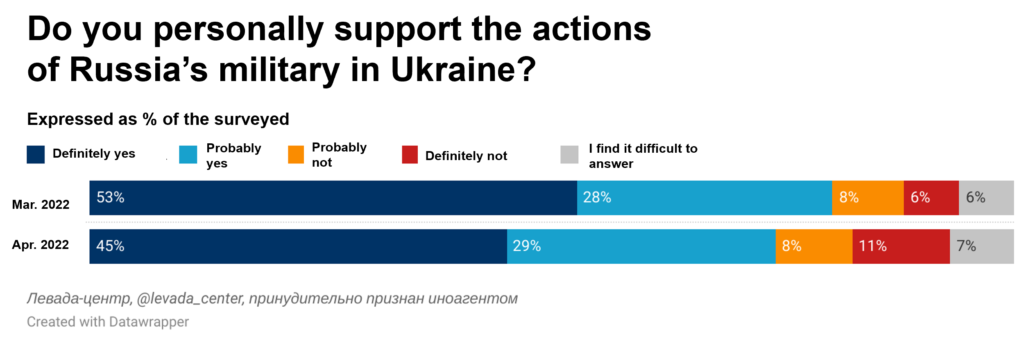
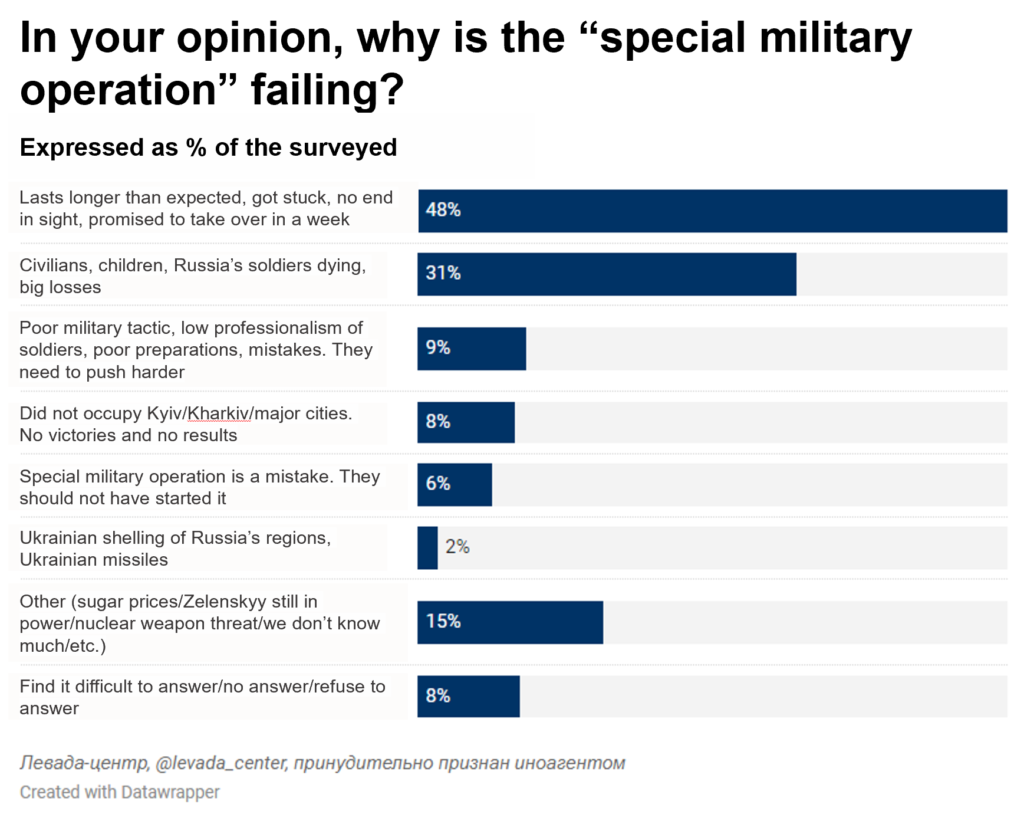

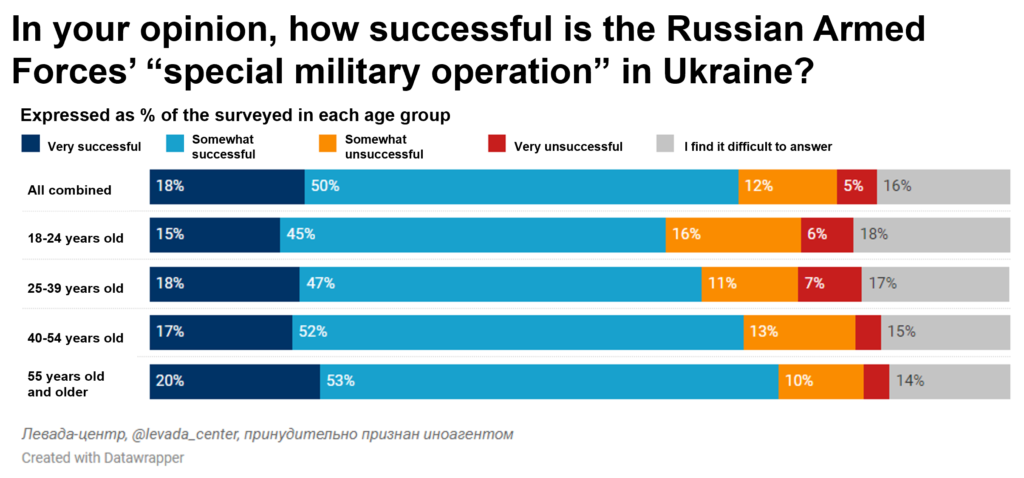
The new poll also shows that Russians, distressed by the truth about the war, mostly choose not to take active anti-war positions, but instead disengage and limit their exposure to the coverage of the war. The number of Russians who follow the events in Ukraine fell from 64% in late March to 59% in late April; with those who pay “close attention” dropping from 29% to 26%. It’s important to find ways to counter this disengagement to sustain domestic pressure to end the war.
Another poll by an international advertising outfit Group M gaged trust in Russian TV. The poll surveyed 1,700 Russians aged 18 to 60 living in cities with population over 100,000. The results captured an even deeper plunge. Whereas on March 17, television led as “the most trusted information source” with 33%, on April 27, this number stood at 23%, levelling off with reliance on social media (also 23%), trust in which has increased.
These figures show that Putin’s propaganda has its limits, and counter-propaganda efforts do bear fruit. In March 2022, Navalny Live YouTube channel hit a record in terms of unique viewers — over 20 million and a great majority of them from Russia. This number represents one-sixth of the total Russian adult population and about half of politically-active Russians (i.e. population which consistently follows political news and events). Between March-April 2022, personal YouTube channel of Vladimir Milov, the author of this article, for the first time exceeded 1 million unique monthly viewers, attesting to its emergence as a significant media outlet in its own right. The combined in-country audience of independent YouTube channels run by Russian opposition figures, independent journalists, investigative outlets easily exceeds 30 million unique viewers per month.
YouTube continues to operate in Russia—Putin is clearly afraid to shut it down. YouTube is an extremely popular platform among Russians, it is watched by about 80% of the Russian population. So far, the platform has not complied with the demands from the Russian government to take down individual videos. Full blocking of the platform is risky— as it will likely create a disgruntled constituency of dozens of millions of angry citizens stripped off their favorite daily content like children’s cartoons, music videos, comedy and other entertainment. The”YouTube phenomena” shows that Putin’s actions are still constrained by public opinion. No matter what happens next, YouTube’s continued operation two and a half months into the war has rendered a powerful blow to Putin’s disinformation war— the truth broke in, propaganda’s monopoly has been cracked.
The poll figures allow to draw some important conclusions. Russians are not “imperialists by nature”, they have been simply brainwashed by propaganda. It is possible to change their mind, and to do so relatively quickly. Counter-propaganda efforts work. The demand for alternative truthful channels of information is growing. In the next few months, these trends are likely to accelerate.
Just as Ukraine is beating Putin on the battlefield, so can we win the war against him in information space. From the learning that has taken place since February, a few useful suggestions: 1. it is unhelpful to berate Russians as a “hopeless” society which will “always be imperialistic” and more can be achieved from dropping this deterministic tone; 2. Amplifying the messages and expanding the reach of existing channels created by talented Russians taps into their massive audiences and leverages their credibility when we simply don’t have the luxury of time to develop those from scratch. Information campaigns are much cheaper than heavy weaponry, but the effect is similar— it opens the “third front” against Putin, complimentary to Ukrainian military resistance and Western sanctions, turning the Russian public opinion against the mad bloodthirsty dictator. With all the challenges, it’s possible, as we see in the most recent public opinion figures. Let’s double down on the hard work.
No one in Russia wants a long-term war, and the mobilization for the war is unpopular
By Vladimir Milov
December 30, 2022
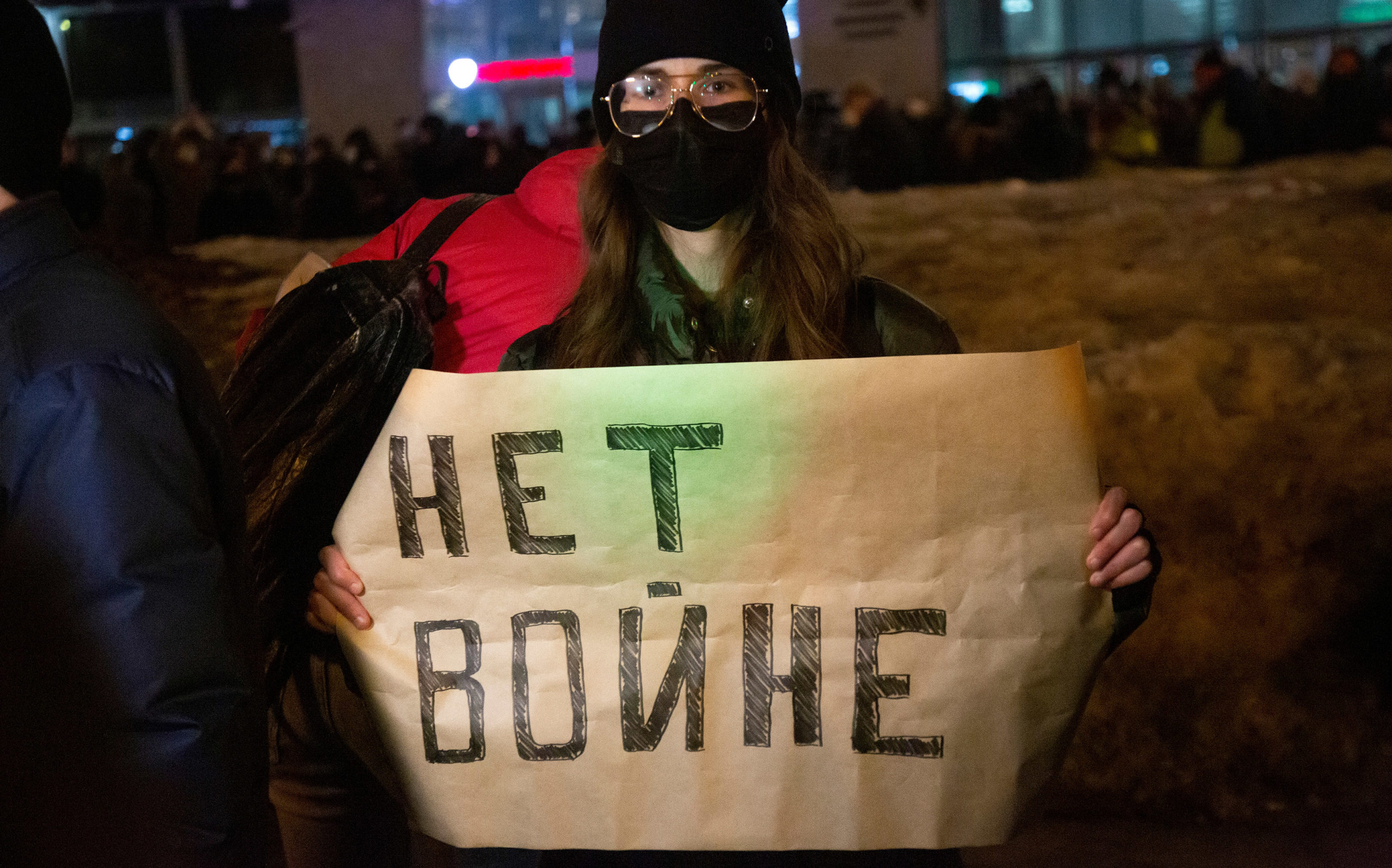 Article
Article
Leading up to the full-scale invasion of Ukraine in February 2022, the Putin regime had moved to systematically destroy all independent media inside Russia. Hundreds of journalists were forced to leave the country due to the Kremlin’s pressure and fears for their freedom and physical safety
By Yury Krylov
December 24, 2022
 Article
Article
The mobilization announced by Putin a few days ago has become a watershed event for Russia
By Fedor Krasheninnikov
October 03, 2022
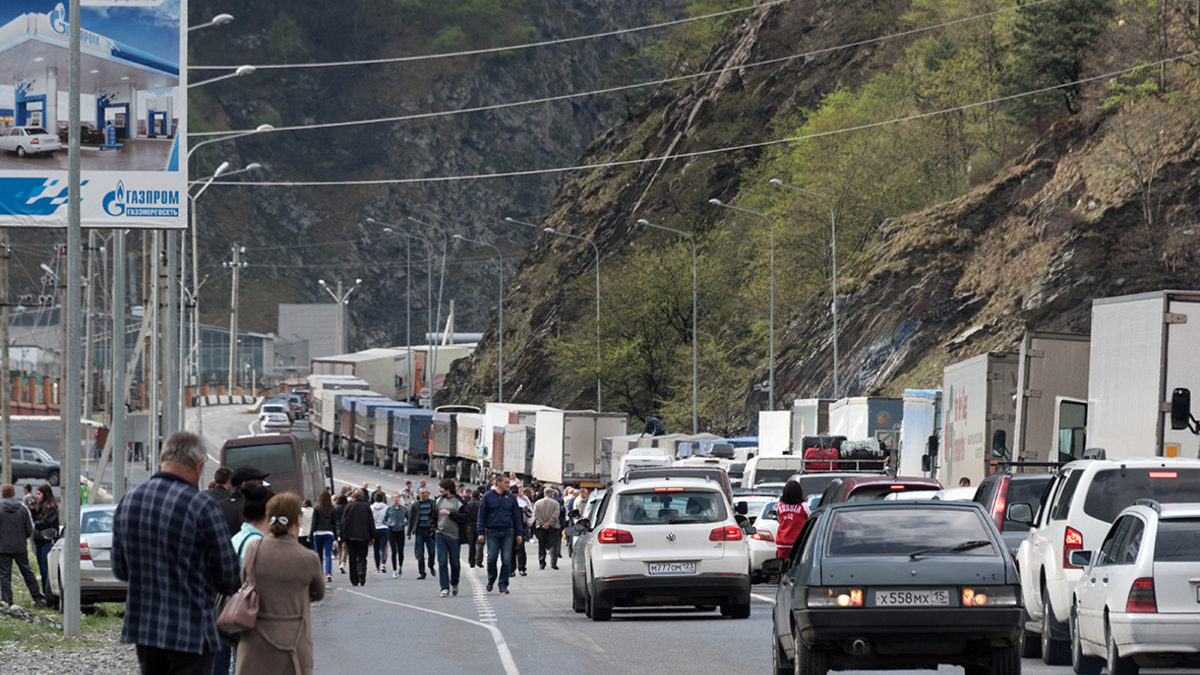
No one in Russia wants a long-term war, and the mobilization for the war is unpopular
By Vladimir Milov
December 30, 2022
 Article
Article
Leading up to the full-scale invasion of Ukraine in February 2022, the Putin regime had moved to systematically destroy all independent media inside Russia. Hundreds of journalists were forced to leave the country due to the Kremlin’s pressure and fears for their freedom and physical safety
By Yury Krylov
December 24, 2022
 Article
Article
The mobilization announced by Putin a few days ago has become a watershed event for Russia
By Fedor Krasheninnikov
October 03, 2022
